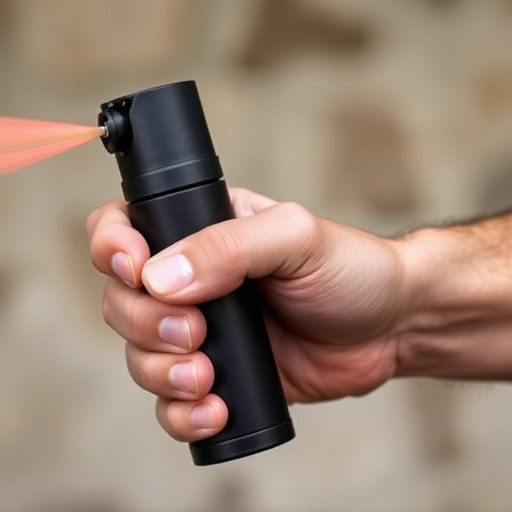Pepper spray, a popular personal safety tool, requires proper storage according to regional laws, especially in cars. Keep it in secure, accessible locations like glove boxes or consoles, away from extreme temperatures and direct sunlight. Ensure good ventilation, check expiration dates regularly, and store spare units for emergencies. In an attack, pepper spray temporarily disables attackers by targeting their eyes and respiratory system. For optimal readiness, maintain, test, and train properly on its use, considering wind direction and range to minimize cross-contamination and enhance self-defense capabilities.
“In today’s unpredictable world, being prepared for potential attacks is paramount. One effective self-defense tool gaining popularity is aerosol spray, particularly pepper spray. This article explores its power as a defense mechanism against attackers, focusing on ‘pepper spray storage in car’ – an essential aspect of personal safety. We’ll uncover the effectiveness of this spray, navigate legal considerations, and provide practical tips for optimal storage. Additionally, we’ll delve into defensive strategies, empowering you to stay safe during emergencies.”
- Understanding Pepper Spray: Its Effectiveness and Legal Considerations
- Optimizing Pepper Spray Storage in Your Vehicle: Tips and Best Practices
- Defensive Strategies: Using Pepper Spray During an Attack
Understanding Pepper Spray: Its Effectiveness and Legal Considerations
Pepper spray is a non-lethal self-defense tool designed to temporarily incapacitate an attacker, providing users with a chance to escape. It works by irritating the eyes and respiratory system, causing temporary blindness, coughing, and difficulty breathing. This simple yet effective mechanism has made pepper spray a popular choice for personal safety, especially for individuals who feel vulnerable in certain environments.
When considering pepper spray as a defense mechanism, it’s crucial to understand its legal implications. The use of pepper spray is regulated by local laws, and what constitutes reasonable force can vary significantly. For instance, the legal considerations for carrying pepper spray in your car differ from those for personal carry. Always check your state’s regulations regarding pepper spray storage in cars, as well as any restrictions on its use. Knowing these guidelines ensures that you’re not only prepared but also legally compliant.
Optimizing Pepper Spray Storage in Your Vehicle: Tips and Best Practices
When storing pepper spray in your vehicle, consider both accessibility and longevity. Keep it within easy reach, but also protected from extreme temperatures and direct sunlight. The ideal location is a secure compartment like a glove box or console, away from seats and floors that might collect moisture. Ensure the container is sealed tightly to prevent leakage, and remember that proper ventilation in your car is crucial to avoid buildup of irritant gases.
Regular maintenance is key. Check expiration dates regularly, as pepper spray can lose effectiveness over time. Additionally, inspect for any signs of damage or corrosion. Storing spare units strategically throughout your vehicle—in the trunk, under seats, or even concealed compartments—can ensure you have a backup in case one fails or becomes unreachable during an emergency.
Defensive Strategies: Using Pepper Spray During an Attack
During an attack, one effective defensive strategy is the use of pepper spray. This non-lethal self-defense tool temporarily incapacitates an attacker by irritating the eyes and respiratory system. It’s crucial to store pepper spray in a secure location within your car, such as underneath a seat or in a locked glove compartment, for easy access during emergencies. Ensure it’s well-maintained and regularly tested to guarantee its functionality when needed.
Proper training on how to use pepper spray is also essential. Familiarize yourself with its range, wind considerations, and the best techniques to deploy it effectively while keeping yourself safe from cross-contamination. Regularly reviewing these skills can significantly enhance your ability to defend against attackers if the need arises.
Pepper spray can be a powerful tool for self-defense, but its effectiveness depends on proper understanding, storage, and application. By following the best practices outlined in this article—from recognizing legal considerations to optimizing pepper spray storage in your car and employing defensive strategies—you’ll be better equipped to protect yourself during an attack. Remember, preparation and knowledge are key to ensuring you’re ready when it matters most.
